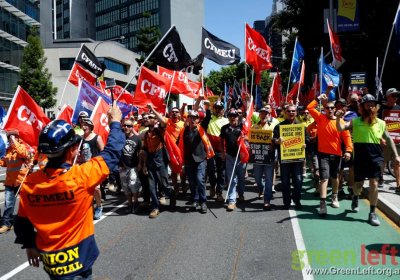Making employees feel insecure and in permanent competition for continuing work is one well-worn pathway for ensuring workplaces are compliant, wages stay low and conditions are minimal, writes Pip Hinman.
penalty rates
From July 1, Prime Minister Scott Morrison will receive a 2% pay rise on top of his already inflated parliamentary salary. Morrison currently earns $538,460 a year and in a few weeks time will earn an additional $10,000 a year. The current base salary for federal MPs and Senators is $207,100.
I will happily take any opportunity to wave a red flag in public. My chance to do so this year was on May 1, the International Workers' Day.
In an interview with Sky News on March 8, finance minister Matthias Cormann said, “The whole reason why it is important to have flexibility in the labour market … is … to ensure that wages can adjust in the context of economic conditions, is to avoid massive spikes in unemployment … That is a deliberate design feature of our economic architecture.”
The Federal Court has dismissed a legal challenge by United Voice and the Shop, Distributive and Allied Employees Association (SDA) to the Fair Work Commission's (FWC) decision to cut penalty rates for pharmacy, hospitality, retail and fast food workers.
The court found on October 11 that the commission met its legal obligations when it decided in February to cut Sunday and public holiday penalty rates for full- and part-time workers.
Life is about to get a lot tougher for 700,000 workers and their dependents when the penalty rate cuts hit on July 1. It is also the day politicians will get a 2% pay rise.
Full and part-time workers in the retail, fast food, hospitality and pharmacy industries are the first to be hit. The ACTU calculated that casuals in the pharmacy industry will face an annual cut of up to $6000 as the result of a February ruling by the misnamed Fair Work Commission.
Unionists held a protest in favour of penalty rates on May 27 outside the Liberal member for Corangamite Sarah Henderson’s Geelong office. Adele Welsh, a social worker and member of the Australian Services Union and Geelong Trades Hall Executive, gave this speech at the protest.
* * *
The so called Fair Work Commission made the decision on February 23 to cut Sunday and public holiday penalty rates, affecting nearly 500,000 workers in the retail, hospitality and fast food sectors.
The cuts to public holiday penalty rates will take effect from July 1, however it has not yet been decided when the cuts to Sunday rates will take effect.
Jesse Lee* is organising the Sydney leg of the March in March protest on March 25. She lives in Sydney’s west and is the primary carer for one of her children. She has first-hand experience of the welfare cuts and the vagaries of the disability support scheme.
Lee put her hand up to organise the Sydney march because she strongly believes that protests are important and they work. She also believes that now is not the time to be quiet.
Thousands of unionists attended protests around the country on March 9 in opposition to the federal government's new building code, the reintroduction of the Australian Building and Construction Commission (ABCC) and its planned penalty rate cuts.
The rallies were called by the CFMEU Construction Division and supported by the ACTU and individual unions. Community anger against the cuts to wages and conditions was palpable.
The recent Fair Work Commission (FWC) decision to cut penalty rates for weekends and public holidays will deliver a windfall to big retail and hospitality bosses, while slashing the wages of about 700,000 low-paid workers.
Figures released by the ACTU put the average worker in accommodation and food services on only $524 a week and those in retail on just $687. Contrast this with the average pay of $1163 for all Australian workers and you can see just how draconian FWC’s decision is.
The February 23 ruling by the so-called Fair Work Australia Commission to allow the slashing of weekend penalty rates for those working in the food and retail sector is a direct attack on some of the most vulnerable and underpaid workers in Australia.
Green Left Weekly’s Chris Jenkins spoke to Aaron Beardsell, WA state organiser of the newly formed Retail and Fast Food Workers Union (RAFFWU) about the new union and the challenges facing workers in their sector.
* * *
- Page 1
- Next page











